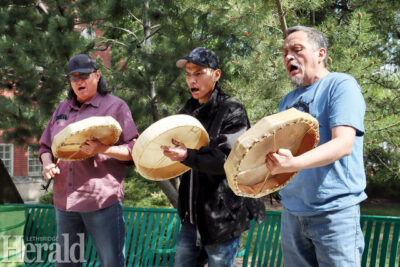Recovery camp project taking shape
By Al Beeber - Lethbridge Herald on June 2, 2022.
 Herald photo by Al Beeber
Mark Brave Rock, Albert Wolf Child and Eldon Chief Calf drum at Galt Gardens on Wednesday during Alvin Mills' announcement of a recovery camp pilot project on Blackfoot territory.
Herald photo by Al Beeber
Mark Brave Rock, Albert Wolf Child and Eldon Chief Calf drum at Galt Gardens on Wednesday during Alvin Mills' announcement of a recovery camp pilot project on Blackfoot territory.LETHBRIDGE HERALDabeeber@lethbridgeherald.com
Alvin Mills is starting to see his vision to help addicts recover become a reality.
Mills, the founder of the Kii Mah Pii Pii Tsin (Kindness to Others) Healing Centre, who works tirelessly to get addicts back on their feet, has secured funding and a site for a traditional recovery camp.
Mills expects to start offering help to Indigenous addicts living in Lethbridge as early as June 13 in a traditional setting on Blackfoot territory.
Addicts will live in tipis and get counselling from elders and peers who Mills says have “lived through the fire” to help them get off drugs. Participants will also get referrals to appropriate support services at the end of their weeklong stay.
Because the camp is on community land, no infrastructure will be built, he said.
On Wednesday at Galt Gardens, Mills made a public announcement about the camp which has funding support from the federal government.
The $120,000 funding for the project comes through Ottawa’s Reaching Home – Indigenous & Designated Communities grant. It is being administered through the City of Lethbridge, said Mills adding a team from the City has worked tirelessly on the project.
The recovery camp is a three-month pilot project which will run seven-day camps for men and also for women. Participants will have to be clean for a period of four days before being admitted to Mills’ program.
Eight men and eight women will participate in alternating camps. The final two intakes, however, are for families who will strive to leave the world of addiction together.
“Whole families have been affected by addiction,” said Mills.
“They’re starting to overdose on the streets and in the alleys,” he said of Indigenous people in Lethbridge before Wednesday’s announcement.
“The opioid situation is getting bad,” Mills said.
His plan is to get addicts out of the city and away from the drug dealers who exploit them, said Mills.
The recovery camp will be done “through the Blackfoot lens. Our own people are going to help heal our own people” with people making a connection to their land and culture,” said Mills.
The site is located about 10 minutes outside of Lethbridge city limits.
About 300 Blackfoot members are living on city streets right now, said Mills, a former boxer in his youth who has battled and beaten his own personal demons.
“It’s been quite exciting getting to this point. It’s been years and years of doing front line work, doing what we can to fight this opioid crisis. And now finally we have this dream coming to a reality. We could get our own people to live out there to get away from all the distractions in Lethbridge,” he said.
“This is almost surreal for me,” said Mills of seeing his vision finally come to fruition.
“In my heart I know this will change lives,” said Mills.
“Urinalysis for opioid dependency will be done to maintain the integrity of the program with participants subject to that if a need is seen,” said Mills.
“All eyes will be upon us,” he said.
Recovery will involve singing, drumming, ceremony “and it will be done in a good healthy way.”
After participants leave the program there will be a continuum of care, he added, which will include Indigenous recovery coaches.
“Once they come through our camps, then they can get housed.”
Mills said he’s reached out to the Kainai Healing Lodge and Kainai Transition as well as the Lethbridge jail.
“We see a high turnaround of dependence. They come in, they get dropped off right at Alpha House. That’s a hot spot for all the stuff that goes on. So instead of them coming out they can come straight to the recovery camp,” he added.
Mills is hoping the project will go longer than three months and work is being done to secure future funding.
Follow @albeebHerald on Twitter
4-3




